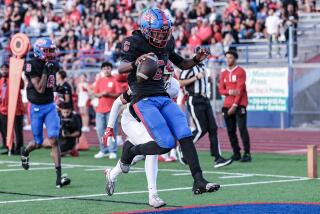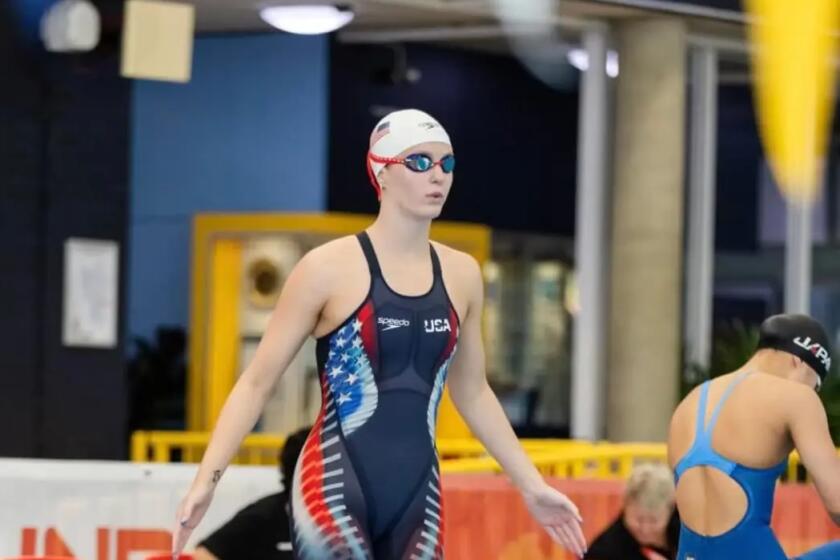LIFE’S HARD, FOOTBALL ISN’T : Servite’s Derek Brown Has Had It Tough Off the Field, but With a Ball in His Hands, They’re All Happy Days
- Share via
“Good game, son. Good game.”
Strange, that out of the greatest game he had played, the greatest high school football game many of the 7,000 people in Glover Stadium had ever seen, what Derek Brown remembers most is post-epic.
Brown of Servite High School and Russell White of Crespi combined for 470 yards and 7 touchdowns in a Big Five quarterfinal playoff game last season. Crespi won the game, 45-37, but this was a saga of two players.
White rushed for more yards, 253 to 217. Brown averaged more yards per carry, 9.6 to 7.6, and scored more touchdowns, 4 to 3. It was a slice of one-on-one, in-your-face, watch-this-then-show-me-what-you-got football so startling that Saturday’s rematch of the schools at Orange Coast College has long been Orange County’s most anticipated game of 1988.
But all of this seemed null, void and vacant when George Brown, just in from Las Vegas, stepped up to Derek Brown after that game.
“Good game, son. Good game.”
Tears don’t easily come to a kid who says, “Life’s hard, things happen,” with a detachment that tells you he has studied the subject matter. But with his father standing before him . . .
“I was shaking. The tears were in my eyes.”
Tears, Derek?
Were they for the father you hardly knew, or the father-figure you made yourself in his absence?
Running always has been easy. You won starting spots on junior-league teams by just running wind sprints. The first time you touched a football in a high school game, on a kick return, you ran it back 90 yards for a touchdown. A lot of times, a grid 120 yards long and 50 yards wide offers more options than the rest of the world.
Money. You see it every day at school. The only reason you can attend Servite is that one of a couple men who have become surrogate fathers has helped your mother, Shirley, pay the tuition. On your way home everyday, you look up and see the mansion on the hill that a Servite student lives in.
You’ve worked since you’ve been a teen-ager. So has your brother, Mark. The three of you--mom, Mark, Derek--pool your money to make ends meet. If there’s one thing a coach never had to teach you, it was teamwork.
You say one one of the reasons you went to Servite was because you “wanted to be well known.” And you are. Everyone who follows high school football in the area knows you. The people of La Habra High School still wonder what might have happened if you’d attended their school. The former coach of that team, Bob Rau, refuses to talk about you.
“It makes me too angry to think of what we might have had,” Rau said.
You were starting as a sophomore running back for one of the best-known programs in the state. That season, you rushed for 334 yards in a game against Mater Dei. From that night on, everyone knew about you.
But fame had its price, or is that a diminishing return? Every football season means you can’t work, neither can Mark, who’s a junior running back at La Habra.
“Things get kind of tight for the family during the season.”
Pressure? Pressure isn’t third-and-one, pressure is knowing that when the season ends, you have to find a job.
“When I’m not working, that puts a lot of pressure on my mom,” Derek says. “I want to do my part. I feel I have to. Since my father left, I guess I put myself in the position of being the head man. That’s pretty hard on me because I’m still young and sometimes I just don’t know what to do.”
Coach: What’s your name?
Kid: Derek Brown.
Coach: Are you any good?
Kid: Yes.
Derek Brown was 12 when he asked Bill Velasco if he could try out for the La Mirada junior All-American football team. Velasco felt a tap on his shoulder and turned to find “this beautiful specimen of a child.”
Velasco put Brown through a couple of wind sprints, picked his jaw off the ground and promptly inserted Brown as the starting tailback.
“He was as natural as they come,” said Velasco, who has coached junior football for 21 years.
Brown, now 5-feet 11-inches, 180 pounds, admits he was a “scaredy-cat,” when he started. A few of his uncles had promising football careers ended because of serious injuries. To this day, Derek and Shirley sit around the kitchen table the night before a game and pray that he doesn’t get hurt.
“There’s no way I could play if we didn’t.”
Shirley says she prays during the game. So does Derek.
In that one year of junior football, he became close with the Velasco family as well as the family of Harold Bishop, who was an assistant coach on the team.
Bishop and Velasco were struck by Derek’s mild manner, the polite way he went about things. They learned that his mother and father had been divorced when Derek was too young to know what divorce was. They found out that money was a problem.
Derek and Mark would sometimes spend the night over at the Velascos’. Bishop took them water skiing on the Colorado River and they stayed in the family’s house in Bullhead City, Ariz.
Having been involved for so long with youth sports, both men had taken their share of kids under wing. But Derek was special.
“There was a certain attraction to a kid that could take such control on a playing field, and who seemed so vulnerable off it,” Velasco said. “He had taken the position of father in the family. That’s a lot of responsibility for a young boy to take on. He needed guidance.”
Brown laughs now about Bishop’s “loooooong” lectures on subjects that rarely touched on football. He didn’t laugh then.
“I imagine there were times when Derek would have liked to just get up and leave,” Bishop said. “But I think, deep down, he knew he needed something.”
If he didn’t know then, he knows now.
“I needed a stern hand,” Brown said. “My mother is so nice, but a boy needs a father to be around. I wished my father was here, everyday.”
Even more than Velasco, Bishop filled that bill. “I consider him like a father,” Derek says. It was Bishop who bought Derek shoes when he needed them. It was Bishop who introduced the idea of going to Servite. It was Bishop who enrolled Derek, along with his own son, Steve, at the school and helped pay for the tuition.
Brown’s reputation in junior football had been so great, that when he decided to go to Servite instead of La Habra, the whispers started.
“This kid was destined (to be great),” said Johnnie Weatherspoon, a former president of the La Habra Booster Club president who has three sons who received major college scholarships after playing football at La Habra. “There were all types of rumors flying around. There still are.
“I went up to him once and asked if he was happy there and he said yes. I told him that was the most important thing. But some people can’t let it go.”
Brown practiced more than a week with the La Habra freshman before Servite accepted him.
“La Habra was just the back-up plan,” Brown said. “I wanted to go to Servite the whole time.”
The fall before, Brown and several other junior All-American teammates went to see a Servite-Mater Dei football game. He saw the stands teeming with people. That’s what he wanted.
And what Derek wanted has remained a hot topic in the area.
There are some people who are convinced that Bishop has something to gain out of Brown attending Servite. Some have said that Bishop was an assistant coach trying to get a college job hanging on Brown’s jersey.
The fact is that Bishop is not an assistant coach at Servite. He works for a paint company. The fact is that even when Brown wasn’t getting many carries during the first six games of last season, Bishop never said a word.
“I’ve been a youth-league coach long enough to know how much I hate meddling parents,” he said. “I consider Derek a son. But like I did with my own son, I told him once he got there, what he did was up to him. He could work hard and succeed at school and sports or he could let himself down.”
Brown hasn’t done that.
He is generally regarded as the second best high school running back in the state. White is thought to be the best. This is not Derek Brown’s thought, however.
Though he’ll admit White is the best high school running back he has ever watched, Brown believes the best running back in the state stares back at him every morning from the mirror.
He rushed for 1,134 yards and scored 11 touchdowns in 10 regular-season games as a sophomore. Last season, he started slow when carries were hard to come by. Then head Coach Leo Hand went to a passing offense that utilized the talents of quarterback Jason Frank. After an overwhelming Angelus League loss to St. Paul, Brown went to Hand and pleaded for the ball.
He got it and ended up rushing for 1,080 yards and 15 touchdowns during the regular season. Hand later admitted that he had made a mistake.
“You have to get the ball to a kid that good,” he said.
And such is the philosophy to which first-year Coach Jerry Person has clung. Derek leads Orange County in rushing with 575 yards in 56 carries. He’s on a pace to get nearly 200 carries this season.
“We win when Derek runs,” Person said. “It’s pretty simple.”
A football field is simple. It has straight lines, the players on it wear different colored uniforms.
Life is another matter.
Football is Derek Brown’s joy, and it causes him grief. He frets over the day he’ll have to leave for college.
“I won’t be around to look over mom and Mark.”
But football has its perks. George Brown is back in town. It’s a safe bet that whatever happens Saturday night . . .
“Good game, son. Good game.”
More to Read
Get our high school sports newsletter
Prep Rally is devoted to the SoCal high school sports experience, bringing you scores, stories and a behind-the-scenes look at what makes prep sports so popular.
You may occasionally receive promotional content from the Los Angeles Times.






